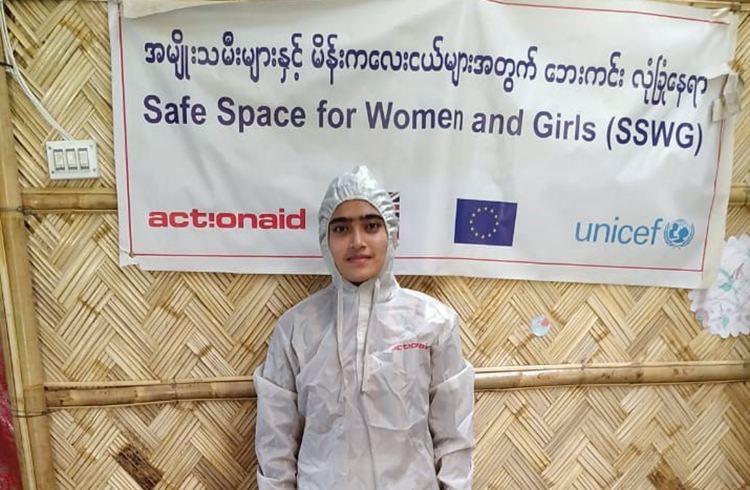Sharmin Akter is 21 years old and a case management worker for ActionAid, who supports women and girls living in the Rohingya refugee camps in Cox’s Bazar, Bangladesh.
“Now that Covid-19 has reached the Rohingya refugee camps, there is a very real risk that the virus could spread like wildfire. More than 800,000 people are living here where homes are small, close together and overcrowded. Typically, there are five to seven people living in one 3 x 10 meters shelter made out of bamboo and tarpaulin so social distancing is incredibly difficult.”
In Cox’s Bazar the Rohingya refugees are also particularly vulnerable because their nutrition and health has been very poor after fleeing persecution, and now they are living in a very congested space with limited access to clean water.
Furthermore, the risks are tremendous and women and girls will be impacted deeply: “We are already seeing that gender-based violence has massively increased since the start of the pandemic and now heightened fear of catching the disease will compound the situation.
A young woman that I helped recently needed nine stitches after her neighbour’s husband slashed the soles of her feet with a knife during an argument over hygiene conditions. […] Women and girls are living in a pressure cage.”
On top of this, people are going hungry and struggling to access medical support. Everyone has a ration card and the food is coming into the camp but it cannot be distributed like it used to be. Due to social distancing, staff are working on a rota which reduces the amount of food that can be distributed each day. The queues for food are very long and some people are going home with nothing.”
ActionAid is currently engaged in dispelling fake news and misinformation about the disease, and promotes public health messages so that people know how to protect themselves: “I’m running awareness-raising sessions for groups of women and teenage girls showing them how to use the gloves and masks, and how to practice social distancing. Now people across the camp are starting to understand the dangers of the disease and the need to stay safe.
All around the world, there is a lot of uncertainty and fear about coronavirus. At the start of the pandemic, I was scared. But as a humanitarian worker, I told myself I cannot stay working at home. My mother was very worried about me, but I explained to her how much suffering the people we support have already been through and how they needed my help.
ActionAid is working hard to protect their staff and the communities we work with. While working, I wear the correct Personal Protective Equipment (PPE), gloves, a mask and use hand sanitiser.
Even though the work can be tough, I feel proud that I can stand beside the women and girls in the camp during this time. Now that coronavirus has reached the camps, I am very worried for everyone’s safety.”

